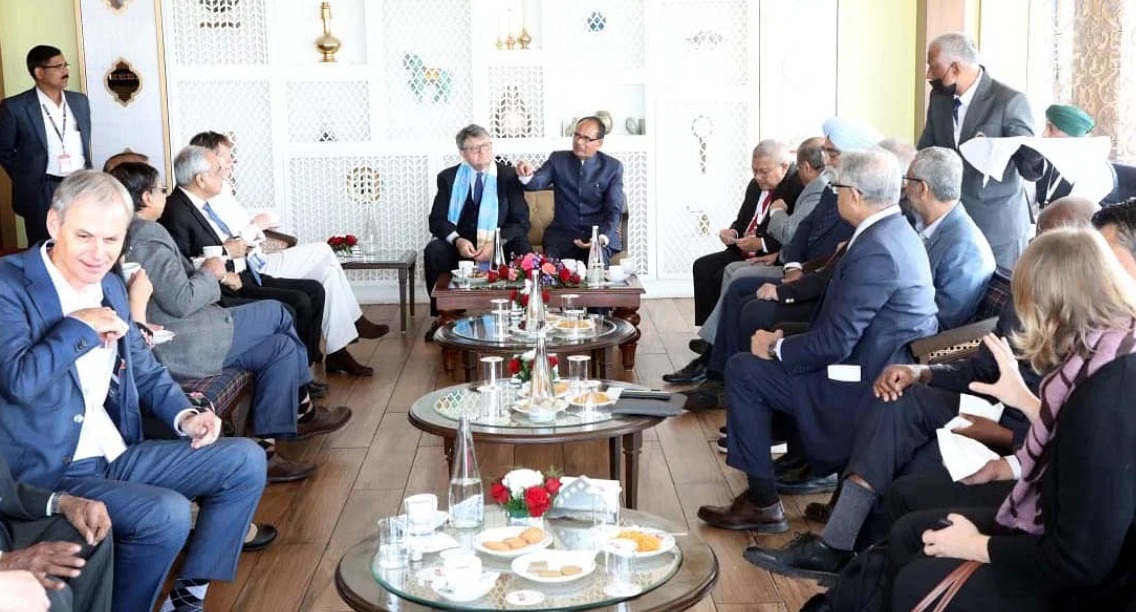
Think20's plenary session-5 in Bhopal
Think20’s plenary session-5 brainstormed on the topic “New complementarities in trade and value chains” in Bhopal which analyzed the impact on trade and the value chain in the Covid period resultantly victimizing the LDCs. Professor Mustafizur Rahman made a significant point explaining that inclusive globalization is the basis of development.
Bhopal: January 17, 2023. The impact on the global value chain during the Covid pandemic has proved a severe blow to global trade and the economy. During this period, trade restrictions and pressure on supply chains especially targeted less developed and low-income countries. Prof. Mustafizur Rahman, Center for Policy Dialogue Bangladesh chairing Think20’s Plenary Session-5 “New Complementaries in Trade and Value Chains” at Kushabhau Thakre International Convention Center, Bhopal.
Pro. Rahman said that today when we are talking about global development, it is important that our model of development is inclusive. There should be access to technology and special trade provisions to ensure the participation of underdeveloped and developing countries with competitiveness. This will be helpful in establishing access to the global market of these countries. He said that in today’s fast-changing economy, there is a need to further strengthen the global value chain.
Dr. Posh Raj Pandey, Chairman, SAWTEE, Nepal, mentioned the impact of changing geo-political, and geo-economic environment on trade and value chain. Advanced technology, reducing the cost of communication and transport systems with universal access to digitization will be helpful in empowering the value chain. He also stressed, triangular cooperation with South-South, and North-South cooperation. Along with the global value chain, the regional value chain should also be strengthened. Participatory innovation, supply of information, and integration of knowledge will be positive initiatives in this direction. The availability of capital and rationalization of non-tariff barriers in the least developed countries will strengthen the global value chain and promote trade participation.
India’s G20 presidency under the leadership of PM Modi gave message of a people-centered development model tO world
Mikatekiso Kubai, Researcher, Institute of Global Dialogue, South Africa, started his address by expressing gratitude towards the warmth and welcoming spirit of the citizens of Madhya Pradesh and Bhopal. Kubai said that India’s G20 chairmanship under the leadership of Prime Minister Shri Narendra Modi has given the message of a people-centered development model to the world. He said that development is not just GDP growth but positive progress in the lifestyle of every person is also vital. He said that infrastructure development is needed to promote trade in Africa today. For this, Africa needs finance at a reasonable rate. This will provide a global market for local products, which will help in making African countries self-sufficient. Referring to the decisions taken in the previous G7 and G20 meetings, Kubai called for the commitment of the global community to follow them.
Need for a participatory environment instead of a competitive environment to promote global trade
Olusene Andrew Ishola, Center for Management Development (CMD), Nigeria, said that promoting global business today requires a participatory environment rather than a competitive one. Today the competitive environment has not been able to bring positive results in global well-being. As a solution to this, Ishola suggested setting tariff and non-tariff barriers according to the interests of the Global South.
The global community should unite on the concept of “Local Production to Global Consumption”
Pro. Naval K Paswan, Dean, School of Social Sciences, Sikkim University, said that despite the availability of cheap labor in the least developed and developing countries, the cost of global trade is high due to transportation costs, and tariff-non-tariff barriers. He said that it is necessary for the development that local products get an adequate place in the global value chain. Expressing concern, Pro. Paswan said that today big multinational companies are taking advantage of the global value chain, while small and medium-scale industries are still not able to take advantage of it. Today is the time that the global community should make a united effort on the concept of “Local Production to Global Consumption”. By becoming inclusive of the global value chain, jobs will be created and we will be able to achieve truly global development. During this, he mentioned the efforts from the leadership of Prime Minister Narendra Modi towards ensuring local participation in the Global Value Chain in India. In this direction, Pro. Paswan underlined the efforts of India’s National Logistics Policy, Gati Shakti, Sagarmala, etc.
READ THIS ALSO: Round Table on Global South and Global Governance for Life session concludes in G-20
Reforms should be done in trade policy considering public interest as the basis
Pro. Sait Ekman, The Economic Policy Research Foundation, Turkey virtually participated in the session. Pro. Ekman highlights the different types of Global Value Chains. He revealed that today India’s participation in the global value chain is increasing at the fastest rate in the world. He said that increasing the efficiency and increasing capacity of the global value chain will reduce the trade cost. This will lift about 22 million global population out of extreme poverty.

















